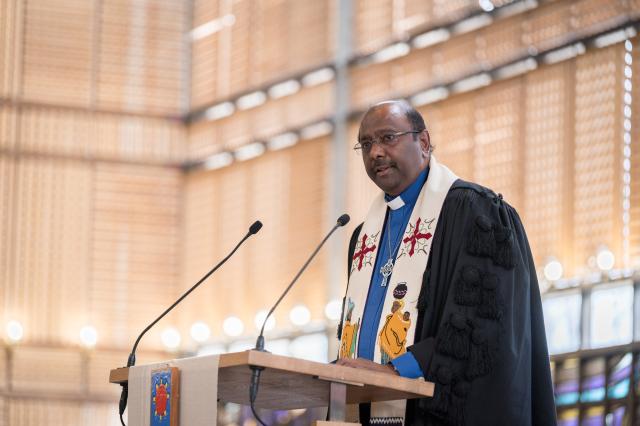“Canadian churches have always stood up for Christian unity and solidarity,” says WCC’s Rev. Pillay

The Rev. Prof. Dr. Jerry Pillay, a Reformed theologian and pastor from South Africa, has served as General Secretary of the World Council of Churches (WCC) since January 2023. On June 8, he will be the preacher at the national Centennial worship service at Gower Street United Church in St. John’s, Newfoundland. The service will be livestreamed on The United Church of Canada’s YouTube channel.
Rev. Pillay has offered a few thoughts about the nature of ecumenism and the strong bond between the United Church and the WCC. The following are excerpts of the interview. The full interview can be found on The United Church of Canada’s LinkedIn page, and as a download at the bottom of this webpage.
As guest speaker at the Centennial worship service, how would you sum up the relationship between the United Church and the WCC, for Canadians?
Ecumenism has been a defining characteristic of the Canadian churches, and the United Church of Canada is one of the oldest organic unions in the ecumenical movement. Canadians and Canadian churches have always stood up for Christian unity and solidarity…The United Church was one of the founding members of the WCC in 1948, reflecting its dedication to Christian unity and cooperation from the outset. It is a vital element in the global ecumenical movement.
Given that 2025 is the 1,700th anniversary of the first ecumenical council at Nicaea in 325, 100 years isn’t all that long in the history of the church. What does Nicaea 325 have to teach us about ecumenism in 2025, and what do you wish for the United Church of Canada for its next 100 years?
The first ecumenical council at Nicaea (325 CE) preeminently reminds us of the centrality of Christ. When Nicaea proclaimed Christ to be “consubstantial with the Father,” it emphasized that nothing else but Christ stands at the center of our faith. That is why the church for more than a thousand years and then also the Reformers and their churches have always been able to refer positively to the Council of Nicaea. But beyond that authoritative tradition, Nicaea has a great significance for the whole ecumenical movement, because not only churches of the Reformation but also the Orthodox and the Roman Catholic churches still today confess the Creed, the beginnings of which go back to the Council of Nicaea.
So, when we reflect on the first ecumenical council of Nicaea and the formulation of the Nicene Creed, we are not merely engaging with a historical relic or an ancient theological formula. We are reminded of the living faith it represents—a faith that testifies to the truth of Jesus Christ, the resurrected Son of God, who is one with the Father and the Holy Spirit. The Nicene Creed is a reminder and call to oneness in faith…It is my wish for the church of Canada that, with Christ at its center, it continues to engage the people of God in the building of the kingdom of God as broadly and globally as the Council of Nicaea did in its day.
What would your answer be to the question, the theme question of Nicaea 2025, “Where now for visible unity?”
To my mind, the call for visible unity provides us with a number of important impulses: first, as mentioned, it encourages us to live our faith in active love with Christ at the center. Second, it provides the opportunity for us to be together on the journey toward unity as a conciliar fellowship, and third, it gives us the chance to make our unity visible through common celebrations.
How important is visible unity in an age when societal norms are tossed aside and international bodies are ignored and discredited? How can visible unity change/influence this?
As a fellowship of churches, we are not paralyzed by fear but driven by hope as pilgrims on the way toward justice, reconciliation, and unity. Our unity lends credibility to our message and advocacy, models reconciliation for a divided world, and witnesses powerfully to the love of God that we experience in Christ.
The connection between “right belief” and “right action” is essential here. The faith we proclaim must not remain in the realm of theological discourse alone. It must translate into concrete action that reflects God’s justice and compassion as we address the numerous injustices in the world, such as economic, gender, climate, and digital injustices.
…Visible unity can call all people of good will to be co-workers in the kingdom of God. Visible unity among churches, therefore, is a powerful sign of God’s healing love. This experience is at the core of Jesus’s prayer in John 17:21, “that they all may be one so that the world may believe.”
Downloads
- christian-unity-in-a-divided-world-rev.-jerry-pillay-interview.pdf (200.74 KB) (PDF)